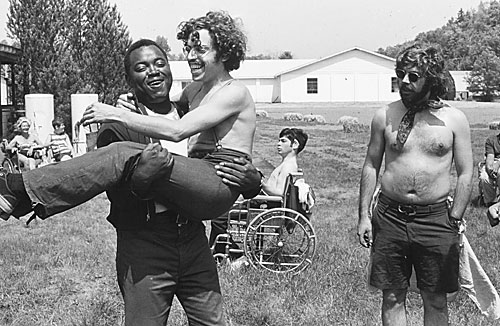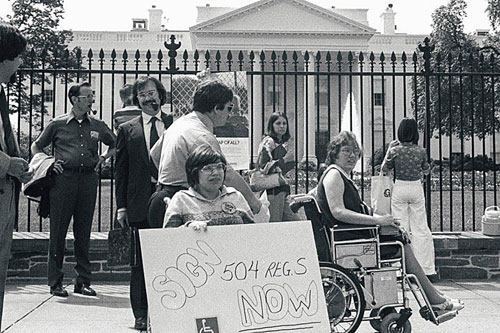|
Movies about women seeking revenge against the men (or, sometimes, the women) who wronged them have been
a hardy perennial in the cinema, from the classy (The Bride Wore Black) to the kinetic (the two parts of Kill Bill) to the witty (The Women) to the revolting (I Spit on Your Grave) to
the rabble-rousing (Thelma & Louise). Emerald Fennell's Promising Young Woman, for which Fennell won both the Oscar and the BAFTA for Best Original
Screenplay, is entertaining and disturbing in equal measure—one of the most notable products of the #MeToo movement so far.
Promising Young Woman begins in a crowded club in an unnamed university town. A group of young men are guzzling drinks and
talking trash about women when they notice Cassie (Carey Mulligan), a woozy young woman sitting nearby. Jerry (Adam Brody) offers to take her home, but on the way he tells
the cab driver to stop at his place instead. Jerry pours Cassie a large tumbler of liqueur, then stretches her across his bed.
"What are you doing?" she asks, slurring her words, as he starts pawing her.
Then she sits bolt upright and stares directly into his eyes.
"What are you doing?" she asks, enunciating like a district court judge.
Cassie dropped out of medical school years before and works as a barista, spurning the efforts of Gail (Laverne Cox), her boss and only
friend, to help her find a better job. She lives in the frilly bungalow of her parents, Stanley (Clancy Brown) and Susan (Jennifer Coolidge). They make their feelings
known about her presence with their gift on her thirtieth birthday: a suitcase.
All of this makes no difference to Cassie. Her true calling in life, as she sees it, is to isolate and humiliate every predatory male
she can. She is spurred to fresh efforts when Ryan (Bo Burnham), an old medical school classmate, walks into her coffee bar.

Ryan is much more interested in reconnecting with Cassie than vice versa,
but he gives her the impetus to move against Madison (Alison Brie), Dean Walker (Connie Britton), Jordan (Alfred Molina), and especially Alex (Chris
Lowell)—all players in a grave injustice Cassie burns to avenge.
Ryan, meanwhile, awakens feelings in Cassie she had thought dead, and she
begins to see love in her future. But then Cassie makes a discovery that reaffirms her core belief: when it comes to sex, there's no such thing as a
nice guy. This is turn leads to a horrific but oddly satisfying ending that can best be described as a high-tech variation on the conclusion of Sleuth.
Promising Young Woman is possibly the worst heterosexual date movie
ever, but as a mordant satire-thriller, it's a smash. A major part of its impact is Fennell's ironic use of romcom tropes. The film's visual palette is
resolutely candy-colored, all the better to rub the viewer's face in the sexual viciousness on display. The soundtrack is filled with bouncy pop oldies
that, taken as a whole, become an anthem to the empowerment of women.
Fennell also cast the film impeccably, starting with Mulligan. Her Cassie is
a fascinating and (mostly) sympathetic angel of vengeance, all the more because we see clearly what her obsession has cost her. One of the film's
most striking scenes shows Cassie standing in the middle of a road, having just smashed the taillights and windshield of an obnoxious redneck's pickup truck (a mini-Thelma & Louise moment). She is immobilized by rage,
unsure of what to do next.

Burnham is notable as Ryan, the nicest guy in the world until he isn't.
Cassie's targets are always protesting that they're nice guys, none louder than Neil, a nerd with a raging cocaine habit. This is Fennell's master stroke
of casting, for Neil is played by Christopher Mintz-Plasse, the immortal McLovin of Superbad. Neil is McLovin fifteen years later, adenoidal voice
and adolescent horniness intact, a beard his only concession to maturity. How many women have dated superannuated McLovins? And just how
funny is McLovin in real life? That is exactly Fennell's point.
For a much more uplifting story of people determining their own fates, you can turn to Nicole Newnham and James LeBrecht's documentary, Crip
Camp: A Disability Revolution. Crip Camp, which won the Audience Award at the Sundance Film Festival and was nominated for an Oscar, tells
the story of a group of people seeking not revenge but justice, and getting it.
Crip Camp is the straightforward tale of the campers and counselors who
met in the early 1970s at Camp Jened, a summer camp in the Catskills for physically disabled teenagers. The film has two sections: the first consists
of home movies taken at the camp, and the second uses archival footage to tell of how the alumni of the camp joined together to fight for the passage
and implementation of laws to help the disabled.

The film is narrated by alumni of Camp Jened, including LeBrecht, who was
born with spina bifida. "They didn't think I would live more than a couple of hours," LeBrecht says of his birth. "Apparently I had different plans."
The movies of Camp Jened show LeBrecht, who was 15 when he went to the camp, and the friends he made there. With the help of the counselors, they
sing, they dance, they swim, they play music and baseball—all the things denied them in the outer world. "The barriers were all around us,"
LeBrecht says in the film. "I wanted to be part of the world, but I didn't see anyone like me in it."
One film clip toward the middle of Crip Camp demonstrates just how
isolated most disabled people were. This is Geraldo Rivera's early-1970s expose of Willowbrook, a home for disabled children. We see footage of
helpless children lying naked on the floor, in scenes of appalling filth.
Inspired by the hippie-activist vibe of Camp Jened, the alumni of the camp
united as activists for disability rights. Their first big test was the fight for implementation of Section 504 of the Rehabilitation Act of 1973, which
forbade discrimination against the disabled. President Nixon claimed Section 504 was too expensive to implement, and Joseph Califano,
secretary of health, education and welfare under President Carter, also declined to take action. Activists staged public protests which stopped
traffic in New York and Washington, followed by a days-long occupation of a federal building in San Francisco, during which the protesters received
unexpected support from groups such as the Black Panthers.
Winning the fight on Section 504 led eventually to passage of the Americans
with Disabilities Act, which was signed into law by George H.W. Bush. News footage of the ADA battle shows disabled activists dragging
themselves up the Capitol steps, making their visual point for the news cameras.

By this time we have the message that the people who came out of Camp
Jened are extraordinarily smart, tough, and dedicated. We get to know them in the course of the film: LeBrecht, longtime sound engineer for the
Berkeley Repertory Theater; Judy Heumann, a polio victim who founded the activist group Disabled in Action and was later special adviser for
international disability rights at the State Department; Denise Sherer Jacobson and Neil Jacobson, two people born with cerebral palsy who met
at Camp Jened, married, and had a normally abled son while conducting successful careers.
Crip Camp ends with some of the surviving campers, now all in their sixties,
returning to the former site of Camp Jened, which closed because of financial problems in 1977. What was once an idyllic space is now a giant
construction site, but as one ex-camper suggests, they all want to kneel and kiss the dirt. This was the place where they learned they could be what they
wanted to be and accomplish what they wanted to accomplish. Crip Camp is a moving and inspiring story of empowerment, and one with universal application.
Promising Young Woman is available for rent on several platforms,
including Amazon Prime, YouTube, Vudu, Apple TV and Google Play. Crip Camp is available on Netflix.
|